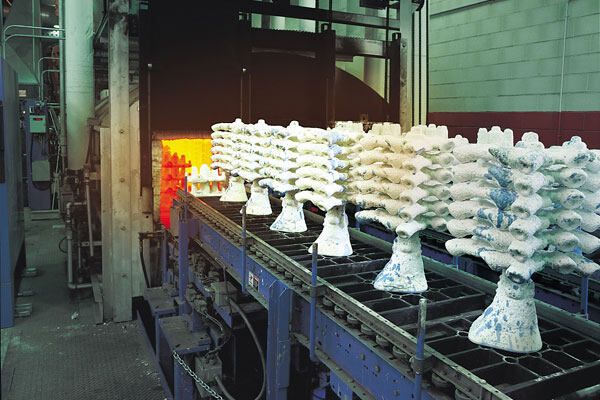Greška u formatu e-pošte
emailCannotEmpty
emailDoesExist
pwdLetterLimtTip
inconsistentPwd
pwdLetterLimtTip
inconsistentPwd

Vijesti

aluminium pressure die casting machine,types of die casting machine,pressure casting machine
A die casting machine is a series of industrial casting machines that hydraulically inject molten metal into a mold to cool and form under pressure, and obtain solid metal castings after the mold is opened.
The working principle of pressure casting machine

Stage 1: Slow injection movement - When the injection starts, the hydraulic oil of the system enters the cavity through the oil circuit integrated plate, and then enters the cavity through the channel, thereby pushing the injection piston to the left to realize slow injection.
Stage 2: Rapid injection movement - when the injection punch exceeds the feeding port of the barrel, the accumulator control valve is opened, the hydraulic oil enters the cavity quickly through the port, the hydraulic oil volume of the cavity increases rapidly, and so does the injection speed.
Stage 3: Pressurization movement - the metal liquid is filled into the cavity, when it is about to end, the alloy liquid begins to solidify, and the resistance of the punch increases at this time. It is controlled by the computer program and the accumulator is used to control the valve to open cavity, thereby pushing the booster piston and piston rod to move quickly to the left.
When the piston rod is engaged with the inner and outer conical surfaces of the floating piston, it is cut off to form a closed cavity, and the boosting effect of the booster piston, the piston rod, the floating piston and the pressure of the cavity together make the piston obtain a booster effect.
What are the types of die casting machines?
Die-casting machines can be basically divided into two categories due to the difference of die-casting alloys, namely cold-chamber machines and hot-chamber machines.
The cold chamber die casting machine is divided into two types: horizontal and vertical according to the structure and arrangement of the press chamber. The clamping mechanism of the hot chamber die casting machine and the cold chamber die casting machine is the same, and the difference lies in the different injection and pouring mechanisms. The pressure chamber of the hot chamber die casting machine is closely connected with the furnace, while the pressure chamber of the cold chamber die casting machine is separate from the furnace.
The cold chamber machine is suitable for the die casting of high temperature alloys such as copper, magnesium and aluminum, while the hot chamber machine is used for the die casting of low temperature alloys such as zinc, tin and lead.
👉Hot chamber die casting machine
The pressure chamber of the hot-chamber die-casting machine is connected with the cyanide, and it is named after the pressure chamber invades into the liquid metal. Its injection mechanism is arranged above the thermal insulation cochlea.
Features of hot chamber die casting machine:
- Die-casting of low-melting-point alloys is usually the mainstay, and zinc alloys are the most typical;
- It is suitable for the production of small die castings, and hot chamber die casting is not suitable for medium and large die castings;
- The molten metal filled into the mold cavity always flows in the closed channel, and the oxidized inclusions are not easily involved, which is beneficial to the quality of the die casting;
- The automation of the die casting process is easy to realize;
- Since the pouring procedure is not required, the production efficiency is high under normal operation;
- The specific pressure of injection is slightly lower, and there is no pressurization stage in the injection process, but it has little effect on small and thin-walled parts;
- The life of hot-worked parts such as injection punches, pouring pots, and nozzles is difficult to grasp and control, and it is time-consuming to replace after failure;
- When replacing or repairing the furnace, it is necessary to disassemble and assemble the hot-worked parts, which increases the auxiliary time;
- For the hot chamber die casting of high melting point alloys, magnesium alloys are still more suitable.
👉Cold chamber die casting machine
Cold chamber die casting machine refers to a type of die casting machine in which the injection chamber and the injection punch are not immersed in the molten metal, but a quantitative amount of molten metal is poured into the injection chamber and then injected. For aluminium, it also called aluminium pressure die casting machine.
Features of vertical cold chamber die casting machine:
- It is suitable for die casting of various alloys such as zinc, aluminum, magnesium, copper, etc.;
- The majority are minicomputers;
- The pressure chamber is placed vertically. After the molten metal is poured into the pressure chamber, the gas is on the molten metal, and less gas is entrained during the injection process;
- The injection pressure has many turning points, which affects the pressure transmission, especially in the pressurization stage, due to the small orifice at the nozzle inlet, the pressure transmission is not sufficient;
- It is convenient to open a central gate;
- The machine occupies a small area in the length direction, but the height of the machine is relatively high;
- When the molten metal penetrates into the lower punch, it is inconvenient to troubleshoot;
- There are procedures for cutting off the remaining cake and lifting the cake in the production operation, which reduces the production efficiency;
- When automatic operation is adopted, the procedure of removing the leftover cake from the top surface of the lower punch is added.
Features of horizontal cold chamber die casting machine:
- It is suitable for die casting of various non-ferrous alloys and ferrous metals (not yet common);
- The production operations are few and simple, the production efficiency is high, and it is easy to realize automation;
- The injection position of the machine is easier to adjust, adapting to the opening of the eccentric gate, and the center gate can also be used. At this time, the mold structure needs to take corresponding measures;
- The technical content of the injection system is relatively high;
- The classification and segmentation of the injection process are obvious and easy to realize, which can meet the various requirements of the die-casting process to a large extent, so as to adapt to the production of various types and requirements of die-casting parts;
- There are few pressure transfer transitions in the injection process;
- The contact area with the air above the horizontal liquid level of the molten metal in the pressure chamber is large, and it is easy to be involved in air and oxidized inclusions during injection; for the die castings with high requirements or special requirements, it can still be satisfied by taking corresponding measures.
In conclusion
The above is all about the classifications of die casting machine and their characteristics, for more information, you want to know about die casting parts, welcome to contact us at any time.

